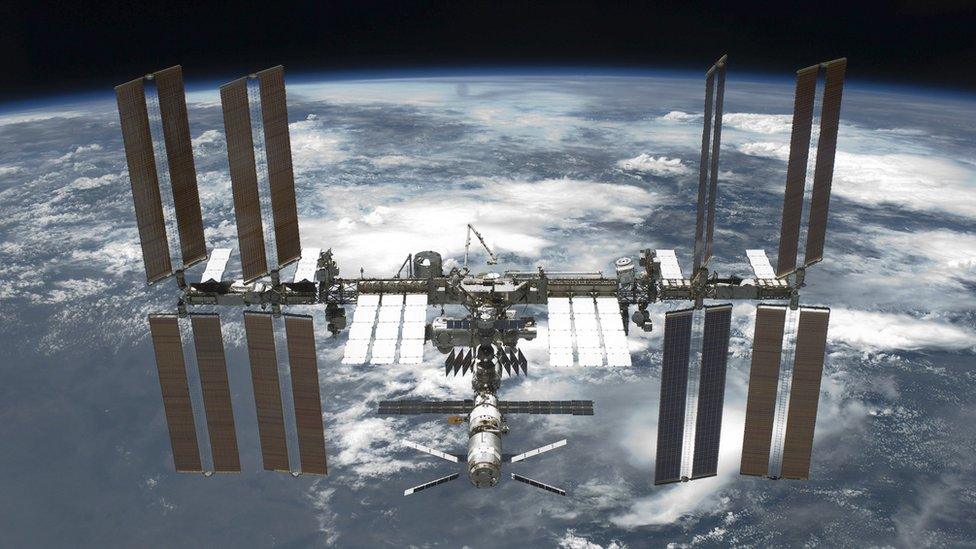UAE in space: Hazzaa Al Mansoori to become first Emirati astronaut
- Published
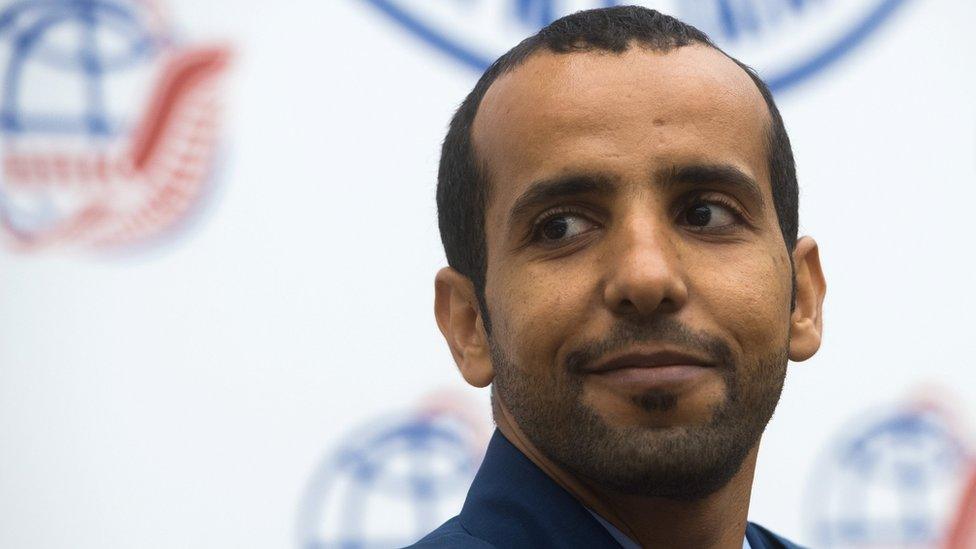
Hazzaa Al Mansoori says he used to think going to space was impossible
Hazzaa Al Mansoori is about to make history as the first Emirati to reach space.
The 35-year-old former pilot is embarking on a mission this week to the International Space Station (ISS) after being chosen from thousands of applicants.
He has said he is "living the impossible".
Only two other people from Arab countries - Prince Sultan Bin Salman Abdulaziz Al Saud from Saudi Arabia and Muhammed Faris from Syria - have been to space. Both of their missions took place in the 1980s.
The trip is being hailed as a positive sign for the UAE's growing space sector. Other plans include an unmanned mission to Mars, with hopes of reaching the red planet in 2021 to coincide with the 50th anniversary of the founding of the state.
"This mission is a great milestone for me personally and for the United Arab Emirates," Hazzaa said at a news conference in July.
Who is Hazzaa Al Mansoori?
Hazzaa said his fascination with space began as a child in Abu Dhabi, capital of the UAE.
"I started to look at the stars since childhood," he recalled, adding that getting that bit closer to them had not seemed possible.
He has also long been inspired by the ambitions of UAE Founding Father Sheikh Zayed, who famously met US astronauts in Abu Dhabi in the 1970s.
But with no Emirati space programme at that time, he settled for taking to the skies as a pilot. After studying aviation at university, Hazzaa joined the armed forces and worked as a military pilot, flying F-16 fighter jets.
It was not until years later that he realised his dreams of space travel could become a reality.
How did he become an astronaut?
In December 2017, the ruler of Dubai and prime minister of the UAE, Sheikh Mohammed bin Rashid Al Maktoum, issued a public call on Twitter for young Emiratis to register for the UAE Astronaut Programme.
More than 4,000 people applied to be in with a chance of becoming the first Emirati astronaut.
Hazzaa and fellow applicant, Sultan Al Neyadi, were selected as the final two after a series of interviews and medical and psychological tests.

You might like to watch
Inside the SpaceX Dragon Capsule that docked on the ISS

Sheikh Mohammed described the pair as representing the "pinnacle of the UAE's ambitions".
History professor Jörg Matthias Determann, author of Space Science and the Arab World, said the founding of the UAE at the height of the US Apollo space programme had inspired Emirati leaders.
"The United Arab Emirates is a young country. It was founded in 1971 - at the height of the Cold War space race and at the height of that lunar accomplishment in particular of the United States.
"This was the high time of US success in particular. The United States itself was trying to make the most of this great achievement by following up with a great publicity campaign."
"The Apollo achievements, they really coincided with the founding moments of the United Arab Emirates."
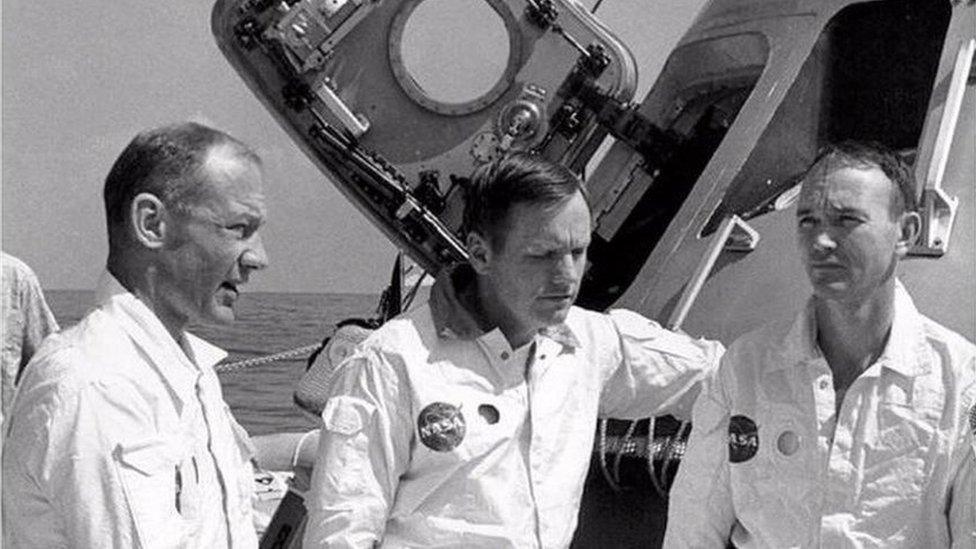
The Apollo mission to the Moon inspired the UAE's space programme
Dubai's Mohammed bin Rashid Space Centre announced in April that Hazzaa had been chosen as the "prime astronaut" to make the inaugural journey, and Sultan as the "backup".
Hazzaa will travel to the ISS with US astronaut Jessica Meir and Russian astronaut Oleg Skripochka for his eight-day mission.
While aboard the ISS, he will carry out scientific experiments and present a tour of the station in Arabic for viewers back on Earth.
"I'm looking forward to coming back with knowledge and experience and to sharing it with everyone," Hazzaa said.
"By living in the International Space Station... it will give us more knowledge and more understanding of how we can go beyond this. To go to the Moon and to Mars eventually."
What will he take into space?
Hazzaa said he would take a family photo to the ISS and a UAE flag.
He will also carry a photograph of the meeting between Sheikh Zayed and the Apollo astronauts. "This is one of the pictures that inspired me and today I am living this dream," he said.
The former pilot is also reported to be taking seeds and a copy of Sheikh Mohammed's book, My Story.
Emirati food has been prepared for his trip, including balaleet - a UAE speciality of sweetened vermicelli served with an omelette - that he plans to share with the other astronauts.
Hazzaa said the mission was a "huge responsibility" but that by taking the UAE's first trip to space he hoped to inspire the next generation of explorers.
- Published15 November 2017
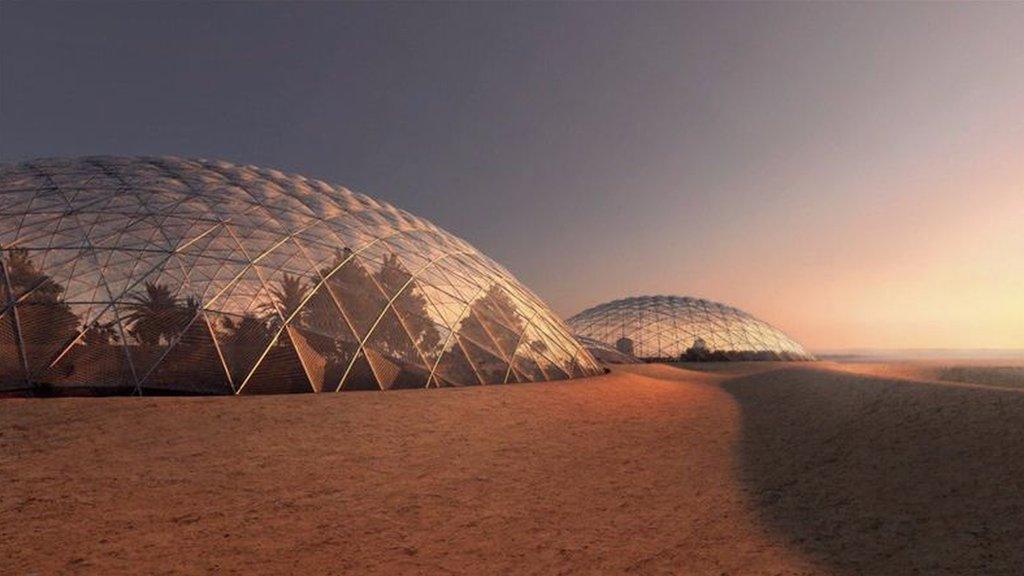
- Published29 May 2015
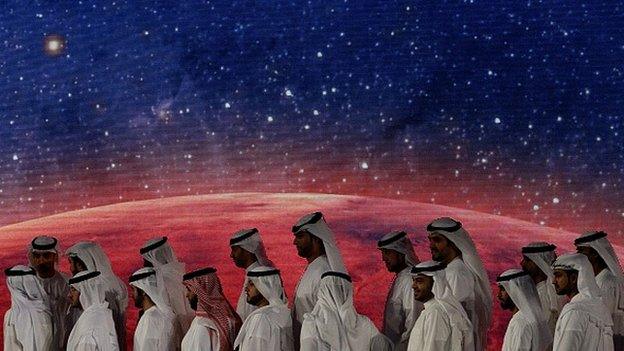
- Published7 June 2019
